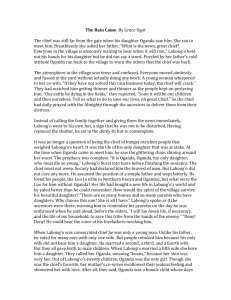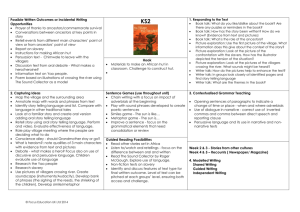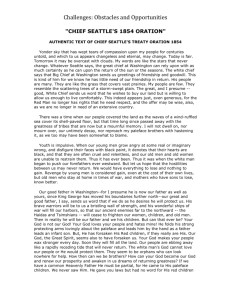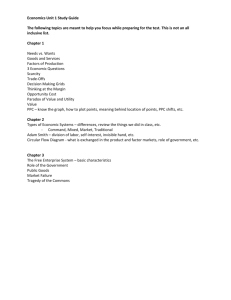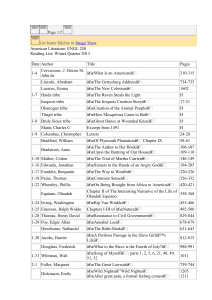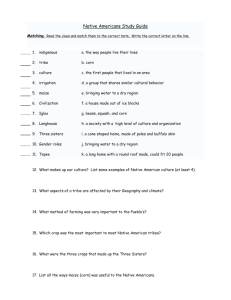The Rain Came – A Luo Legend from Kenya (adapted from the story
advertisement
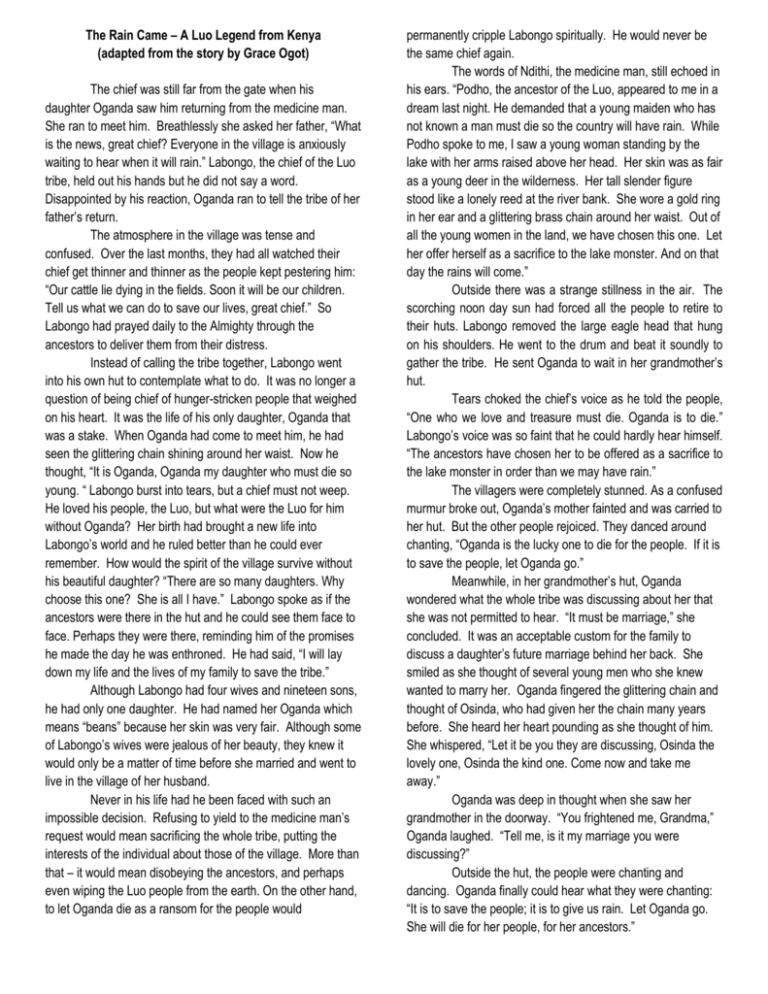
The Rain Came – A Luo Legend from Kenya (adapted from the story by Grace Ogot) The chief was still far from the gate when his daughter Oganda saw him returning from the medicine man. She ran to meet him. Breathlessly she asked her father, “What is the news, great chief? Everyone in the village is anxiously waiting to hear when it will rain.” Labongo, the chief of the Luo tribe, held out his hands but he did not say a word. Disappointed by his reaction, Oganda ran to tell the tribe of her father’s return. The atmosphere in the village was tense and confused. Over the last months, they had all watched their chief get thinner and thinner as the people kept pestering him: “Our cattle lie dying in the fields. Soon it will be our children. Tell us what we can do to save our lives, great chief.” So Labongo had prayed daily to the Almighty through the ancestors to deliver them from their distress. Instead of calling the tribe together, Labongo went into his own hut to contemplate what to do. It was no longer a question of being chief of hunger-stricken people that weighed on his heart. It was the life of his only daughter, Oganda that was a stake. When Oganda had come to meet him, he had seen the glittering chain shining around her waist. Now he thought, “It is Oganda, Oganda my daughter who must die so young. “ Labongo burst into tears, but a chief must not weep. He loved his people, the Luo, but what were the Luo for him without Oganda? Her birth had brought a new life into Labongo’s world and he ruled better than he could ever remember. How would the spirit of the village survive without his beautiful daughter? “There are so many daughters. Why choose this one? She is all I have.” Labongo spoke as if the ancestors were there in the hut and he could see them face to face. Perhaps they were there, reminding him of the promises he made the day he was enthroned. He had said, “I will lay down my life and the lives of my family to save the tribe.” Although Labongo had four wives and nineteen sons, he had only one daughter. He had named her Oganda which means “beans” because her skin was very fair. Although some of Labongo’s wives were jealous of her beauty, they knew it would only be a matter of time before she married and went to live in the village of her husband. Never in his life had he been faced with such an impossible decision. Refusing to yield to the medicine man’s request would mean sacrificing the whole tribe, putting the interests of the individual about those of the village. More than that – it would mean disobeying the ancestors, and perhaps even wiping the Luo people from the earth. On the other hand, to let Oganda die as a ransom for the people would permanently cripple Labongo spiritually. He would never be the same chief again. The words of Ndithi, the medicine man, still echoed in his ears. “Podho, the ancestor of the Luo, appeared to me in a dream last night. He demanded that a young maiden who has not known a man must die so the country will have rain. While Podho spoke to me, I saw a young woman standing by the lake with her arms raised above her head. Her skin was as fair as a young deer in the wilderness. Her tall slender figure stood like a lonely reed at the river bank. She wore a gold ring in her ear and a glittering brass chain around her waist. Out of all the young women in the land, we have chosen this one. Let her offer herself as a sacrifice to the lake monster. And on that day the rains will come.” Outside there was a strange stillness in the air. The scorching noon day sun had forced all the people to retire to their huts. Labongo removed the large eagle head that hung on his shoulders. He went to the drum and beat it soundly to gather the tribe. He sent Oganda to wait in her grandmother’s hut. Tears choked the chief’s voice as he told the people, “One who we love and treasure must die. Oganda is to die.” Labongo’s voice was so faint that he could hardly hear himself. “The ancestors have chosen her to be offered as a sacrifice to the lake monster in order than we may have rain.” The villagers were completely stunned. As a confused murmur broke out, Oganda’s mother fainted and was carried to her hut. But the other people rejoiced. They danced around chanting, “Oganda is the lucky one to die for the people. If it is to save the people, let Oganda go.” Meanwhile, in her grandmother’s hut, Oganda wondered what the whole tribe was discussing about her that she was not permitted to hear. “It must be marriage,” she concluded. It was an acceptable custom for the family to discuss a daughter’s future marriage behind her back. She smiled as she thought of several young men who she knew wanted to marry her. Oganda fingered the glittering chain and thought of Osinda, who had given her the chain many years before. She heard her heart pounding as she thought of him. She whispered, “Let it be you they are discussing, Osinda the lovely one, Osinda the kind one. Come now and take me away.” Oganda was deep in thought when she saw her grandmother in the doorway. “You frightened me, Grandma,” Oganda laughed. “Tell me, is it my marriage you were discussing?” Outside the hut, the people were chanting and dancing. Oganda finally could hear what they were chanting: “It is to save the people; it is to give us rain. Let Oganda go. She will die for her people, for her ancestors.” She could not believe what she was hearing. Oganda suddenly felt panicky like a mouse cornered by a hungry cat. She leapt like a wild tiger though the door, knocking her grandmother to the ground. There outside the door, stood her father Labongo in mourning garments. He took his daughter’s hand and led her to her mother’s hut. For a long time Oganda and her parents sat in darkness. It was no good speaking. In the past they had been like three cooking stones, sharing their burdens. Taking Oganda away from them would leave two worthless stones which would not hold a cooking pot. News that the chief’s beautiful daughter was to be sacrificed to bring rain spread across the land like wind. All her relatives thought it a great honor to be selected by the spirits to die, in order that the tribe might live. “Oganda’s name will always remain a living name among us,” they boasted. Oganda sat close to her mother, crying quietly. All these years she had thought she understood her people, but now she discovered she was a stranger among them. If they loved her like they professed, why were they not making any attempt to save her? As her friends began to dance, Oganda sobbed loudly. They were young and beautiful. They would have husbands and children. She touched the glittering chain at her waist and thought about Osinda. The chain comforted Oganda – perhaps she would die with it on and wear Osinda’s gift into the underground world. The next morning a great feast was prepared for Oganda. Delicious though it was, Oganda touched not a morsel of it. The time of her departure was growing near. It was a day’s journey to the lake. She was to walk all night, passing through the great forest. She was already anointed with the sacred oil. From the time she received the sad news, she had expected Osinda to appear at any moment, but he was not there. In the afternoon the whole village stood at the gate to bid her goodbye. Her mother wept and the great chief came to the gate barefooted, a simple father in grief. He took off his wrist bracelet and put it on his daughter’s slim arm. He said, Oganda, you will always live among us. The spirit of our forefathers is with you.” Unbelieving, Oganda stood before her tribe. She had nothing to say. She felt like a flower nipped in the bud never to enjoy the morning dew again. She looked at her weeping mother and whispered, “Whenever you want to see me, always look to the sunset. I will be there.” Oganda turned southward and began her trek to the lake. Her beautiful slender figure grew smaller and smaller until her form could not be seen in the thin dry trees of the forest. As she walked the lonely path, she sang a song, her own voice keeping her company: “Oganda must die young; Oganda must sleep with the ancestors and the rain will come down in torrents.” The red rays of the setting sun embraced Oganda and she looked like a burning candle in the wilderness. Oganda held her breath as she crossed the barrier to enter the sacred land. Then suddenly the path ended on a sandy beach. Beyond was a vast expanse of water. Trembling with fear, Oganda would not let herself imagine what the monster of the lake might look like. As she trudged along, she had the distinct feeling that she was being followed. Was it the monster? She started to run, and she could again hear something behind her. Something resembling a moving bush was frantically running to catch up to her. She made an effort to cry out when the creature caught up with her. A strong hand grabbed her and she fell to the sand in a dead faint. The lake breeze brought her back to consciousness. A man was bending over her, pouring cool water into her parched mouth. She could hardly believe who it was. “Osinda, Osinda, please let me die! Let me die so the village will have rain!” But Osinda just touched the glittering chain at her waist and wiped away her tears. “We must escape quickly to the unknown land,” Osinda said urgently. We must run away from the wrath of the ancestors and the retaliation of the lake monster.” “But the curse is on me, Osinda. I am no good to you anymore. And the eyes of the ancestors will follow us everywhere and bad luck will befall us.” Listen to me Oganda! Listen! Here are two coats.” He then covered all of Oganda’s body except her eyes with a leafy attire made from twigs of the bwombwe. “These will protect us from the eyes of the ancestors and the wrath of the monster. Now let’s run!” He held Oganda’s hand and they ran together from the sacred land. The bush was thick and the long grass entangled their feet as they ran. Once they stopped to look back at the lake. The sun was almost touching the water. They ran faster, to avoid the sinking sun. When they reached the barrier and looked behind, only a tip of the sun could be seen on the water’s surface. “It is gone! It is gone!” cried Oganda, hiding her face in her hands. “Weep not, daughter of the chief. Let us run. Let us escape.” There was a bright flash of lightning. They looked up, frightened. Above them black furious clouds began to gather. As they started to run, the thunder roared and the rain came down in torrents.
